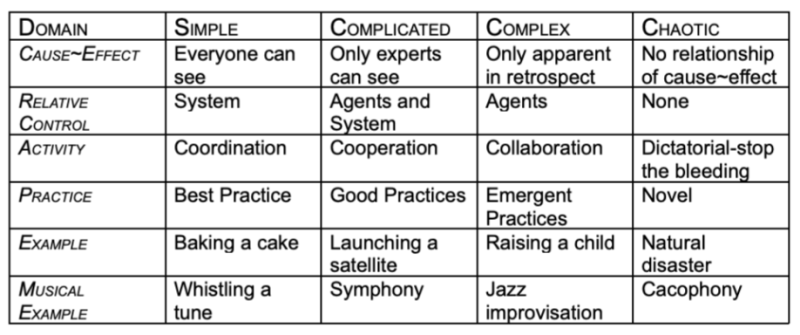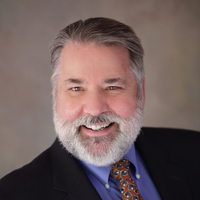At a recent Brownstone authors meeting, Brownstone Fellow Thomas Harrington made a penetrating observation of one of the distinctive differences between Science and The Humanities. I look forward to a deeper examination of this topic by him as this brief comment will not do justice to it. In brief, he emphasized that Science largely deals with a reductive process whereas the Humanities are concerned with a constructive process.
This difference was explored in a fascinating forum from 10 years ago at MIT. The comment from Alan Lightman was especially telling:
Both the sciences and the humanities seek understanding and truth, he said, but the truths they seek are distinct from one another. Scientific truth is external, while humanistic truth lies within human beings — who are by nature ambiguous.
The interplay between Truth and Ambiguity seems central to the topic.
But there is, or at least there was, an alternative to the binary choice of reduction or construction. The rise of Complexity Theory carried with it the prospect of bridging the gap between reduction and construction, and recognizing the simultaneous existence and complementary qualities of both “truth” and “ambiguity.”
The rise of Complexity Science is intimately related to The Santa Fe Institute, the founding of which is related in a very readable and entertaining way in M. Mitchell Waldrop’s Complexity: The Emerging Science at the Edge of Order and Chaos.
A complete definition of “Complexity” is evolving. It is best understood as a study of how “the whole is more than the sum of the parts.” The relationship between “Simple, Complicated, Complex, and Chaotic” domains was the subject of the remarkable essay by David Snowden and Mary Boone in a 2007 article in Harvard Business Review and is clearly explained in a three-minute YouTube video. The video at least should be required viewing for everybody engaged in healthcare, academia, or politics.
There are numerous explanations of the defining characteristics and actions required in each of these domains:


For many years, at least up to 2020, Complexity Science seemed to offer the best of both worlds. In Network Theory terminology, it allowed for a deep understanding of both the nodes (reductionism) and the edges (interconnective constructionism). It recognized the ambiguity of emergent order in the interconnection, but still respected truth. It was wonderful!
But that was destroyed by the Poison of Postmodernism as truth became a relative quality. Ideology became everything. Sadly, that poison found its way even into the very heart of the academic center founded on the separation of ideology from knowledge exploration. In The Complex Alternative: Complexity Scientists on the COVID-19 Pandemic, more than 60 Complexity Scientists present what purports to be a “complex” alternative to “simplistic” approaches:
Simplicity wants to reduce the multidimensional complexity of the pandemic to one or two simple factors, such as: treating it as a bounded epidemic to be eradicated by simply getting the infamous R0 below 1, or by simple behavior and psychological denial as practiced by anti-vaxxers, or by adopting questionable remedies with no proven efficacy, or by achieving safety and prosperity through total isolation, and so on—the whole panoply of simple one-size-fits all approaches for communities and nations. Every one of these factors or explanations—and many more—represent an interactive, interdependent component of the complex, systemic phenomenon that we call COVID-19. We ignore this essential multicomponent interdependency at our peril. (emphasis added.)
Yet, sadly that seems to be exactly what they did—they ignored the essential multicomponent interdependency and accepted as true concepts known at the time (at least by some) to be false and based on ideology rather than scientific validity. Even as I write this essay, (10/6/2024), this is listed as a requirement for employment:
SFI has a mandatory COVID-19 vaccination policy. All employees are required to submit proof of vaccination prior to employment. Any offer of employment will be contingent upon compliance with this policy.
This is in spite of the clear evidence that natural immunity is at least equal, if not superior to, that of the mRNA agents, the mRNA agents do not prevent infection or spread and are associated with a negative risk/benefit ratio for at least some, if not all, individuals. This august institution has fallen prey to an illness itself. Not a physical illness, per se, but a crippling intellectual illness that threatens critical thinking and credibility.
How did this happen? How did so many academic institutions, particularly those dealing with healthcare, get it so wrong? We suffered a Great Ethical Collapse:
Medicine has failed us these past 3 years. But that failure has been part of a much broader failure: Science has failed us. Government has failed us. Academia has failed us. Business has failed us. And, yes, even many of our spiritual leaders have failed us. All have abandoned critical thinking and moral responsibility to a degree we have not seen in the past 80 years. All have been “fundamentally transformed” into Postmodern caricatures of their former selves. “Truth” has become a relative term. Everything, it seems, has been reduced to ideology.
The ”What?” of this drive to Postmodernism is all around us: The loss of liberty and medical totalitarianism of The Great COVID Disaster was impossible for anyone to ignore. But it was only a part of the Great Ethical Collapse. We have seen a true war against women with the transgender ascendancy, not just in women’s sports but in all aspects of womanhood. A Supreme Court Justice could not even define what a “woman” is! Academic scholarship has become meaningless at what had been the premier institutions of learning. Individuals who had dubious qualities of scholarship have risen to the highest levels of leadership in those institutions. Once rigorous academic journals now seem to have become only organs of propaganda. Even spiritual leaders seem to have turned their backs on millennia of truths in a bid to appear more enlightened.
All of this has been at great cost, however. Society as a whole has lost confidence not only in public health, but medicine in general. The pervasive influence of Big Pharma is undeniable to all but the few who remain willfully blind. The inequality of our legal system is on display in the daily headlines. Young women are battered in sport and records are established by what can only be viewed as an attempt at ideological supremacy over rationality. Think back to only a few decades ago when the hormonal advantages of the East German “women “ in the Olympic Games were universally decried.
In an attempt to bow to ideology, major corporations forgot who their customers really were, with catastrophic financial loss. While one would have thought this would have “awakened the woke,” even that did not seem to get their attention.
The debacle of leaders of top universities in their Congressional testimony displayed that “Diversity,” “Equity” and “Inclusion” were just NewSpeak for “Orthodoxy,” “Inequality” and “Exclusion.” And of course, in the background of all of this was a re-emergence of Systemic Antisemitism in academia and all of society. Once again, it became fashionable to hate Jews.
In a phrase, we were “fundamentally transformed” in a process that has taken decades. We see the “What?”, but it is logical to return to the “How.” More from the Great Ethical Collapse:
In a conversation from a few months ago, John Leake shared that the “capture of the institutions” had much to do with the “How?” This agrees with what Christopher Rufo has painstakingly cataloged in America’s Cultural Revolution: How the Radical Left Conquered Everything.
While most of the world thought that the radicalism of Herbert Marcuse died with the demise of the radical Weathermen, they just went underground and began their long march (mirrors Mao’s Long March of the 1930s) through the institutions. First, they captured academic departments, then academic administration, then the media, and finally government and corporations. They brilliantly captured the language of critical theory and words and phrases like diversity, equity, inclusion, white privilege, and systemic racism were repeated and pounded into the consciousness of society. They played the ultimate long game.
As spectacular as the successes of the New Left appear to be, those very successes have sown the seeds of its ultimate downfall. Their “revolution” is empty. As Rufo puts it:
This is where the critical race theorists reach the final impasse. Their program has become a form of empty professional class aestheticism, designed for manipulating social status within elite institutions, not for alleviating real miseries or governing a nation…The revolution of 1968, although it seems to have captured the edifice of America’s elite institutions, might not be as strong as it appears. It has created a series of failures, shortcomings, and dead ends—and in this gap of contradiction, a counter-revolution can emerge…The great weaknesses of the cultural revolution is that it negates the metaphysics, morality and stability of the common citizen…While the revolution seeks to demolish America’s founding principles, the counter-revolution seeks to restore them…The counter-revolution must be understood not as a reaction or a desire to return to the past, but as an movement with the intention of reanimating the eternal principles and reorienting the institutions towards their highest expression. The foundations of the counter-revolution are thus moral in nature, seeking to guide the common citizen towards what is good and to rebuild the political structures so that his moral intuitions can be realized in society…If the endpoint of the critical theories is nihilism, the counter-revolution must begin with hope…The counter-revolutionaries must put themselves in the breach, so that the common citizen can finally look up, with his worn and weary face, toward that eternal and unchanging order that will put him at peace and will allow him to finally escape the emptiness and desolation that surrounds him. (emphases added)…
—America’s Cultural Revolution, pp 277-282
Bingo! Rufo handles, with exceptional scholarship the “How?” as well as points to the “How?” to reverse this disaster. But what about the “Why?” that Simon Sinek emphasizes as central to motivating people? For that, we need to turn to another exceptional author of a book describing the Great Covid Disaster and the Great Ethical Collapse, as they are in reality, just two facets of the same gem.
In Facing the Beast: Courage, Faith and Resistance in a New Dark Age, Naomi Wolf expertly crafts a story of incredible heroes, and disappointing villains, as she relates her own journey of discovery during the Great Covid Catastrophe.
The book is informative as well as a literary masterpiece with exquisitely detailed word pictures. Wolf courageously tackles two central aspects head-on. The first is the similarity of the actions of leaders and just ordinary people in the Great Covid Disaster to the same actions during the rise of Fascism in the 1930s. She does not think the comparison cheapens the unspeakable horrors faced by the Jews, but rather emphasizes how their sacrifices and the Evil perpetrated against them must not have been in vain. Society should have learned….but unfortunately it did not:
There are lessons from history that we must learn, or relearn, and quickly. Some leaders and commentators (including myself) have passionately and publicly been comparing these years, 2020 to 2022, in the West and in Australia, to the early years of Nazi leadership. Although we face criticism for doing so, I won’t be silenced about this. The similarities must urgently be addressed.
People need to reread their Nazi history. They are getting it wrong in demanding, “How dare you compare!”
While the popular imagination of the Nazi era is familiar with death camps, and think of them when Nazi policy is invoked, the fact is that many years led up to that horror. Germany invaded Poland in 1939. The extermination camps were established years into the Nazi drama. R. Josef Mengele, “The Angel of Death,” began his medical experiments in Auschwitz after 1943.
No one sensible is comparing the COVID years to those years and those horrors.
Rather, the vivid similarities between our moment in the West since 2020, and the earliest years of Nazi Germany’s civil society policies, are to the years 1931 to 1933, when so many vicious norms and policies were set in place. But these were often culturally or professionally policed, rather than being policed by camp patrols. That’s the point that better informed analysts of these similarities are making (emphasis added)—Facing the Beast, pp 57-58
This is the same point made by the multi-part video series “Never Again is Now Global.” It was scrubbed from multiple links as part of the Great Censorship, but still is available on Rumble.
Wolf squarely states the “Why?”:
Months before, I had asked a renowned medical freedom activist how he stayed strong in his mission as his name was besmirched, and as he faced career attacks and social ostracism. He replied with Ephesians 6:12: “For we wrestle not against flesh and blood, but against principalities, against powers, against the rulers of the darkness of this world, against spiritual wickedness in high places.”
I had thought of this response often in the intervening time. It made more and more sense to me…
I told the group that I was now willing to speak about God publicly because I had looked at what had descended on us from every angle, using my normal critical training and faculties, and I had concluded that it was so elaborate in its construction, so comprehensive, and so cruel, with an almost superhuman baroque imagination made out of the essence of cruelty itself—that I could not see that it had been accomplished by mere humans working on the bumbling human level in the dumb political space.
I felt it all around us, in the majestic nature of the evil encompassing us, the presence of “principalities and powers”—awe-inspiring levels of darkness and of inhuman, anti-human forces. In the policies unfolding around us I saw anti-human outcomes being consistently generated: policies aimed a killing children’s joy; at literally suffocating children, restricting their breath, speech and laughter; at killing school; at killing ties between families and extended families; at killing churches and synagogues and mosques; and, from the highest levels, from the President’s own bully pulpit down, demands for people to collude in excluding, rejecting, dismissing, shunning, hating their neighbors and loved ones and friends.
I have seen bad politics all my life and this drama unfolding around us went beyond bad politics, which is silly and manageable and not that scary. This—was metaphysically scary. In contrast to hapless human mismanagement this darkness had a tinge of the elemental evil that underlay and gave such hideous beauty to the theatrics of Nazism (sic); it was the sort of nasty glamour that surrounded Leni Riefenstahl films.
In short, I don’t think humans are smart or powerful enough to have come up with this horror all alone. ..
It is time to start talking about spiritual combat again. Because I think that that is what we are in, and the forces of darkness are so big that we need help.
What is the object of this spiritual battle?
It seems to be nothing short of the human soul. (emphases added)—Facing the Beast, pp 43-46
Unfortunately, the exploration of whether or not the gulf between the reductionist mindset of Science and the constructionist approach of The Humanities can be bridged through the third viewpoint of Complexity Theory will have to be put on hold for a while. The caveat has to do with the premise of that forum held at MIT a decade ago: As Alan Lightman observed, both of the disciplines were, at least then, seeking understanding and truth. Sadly, both of those quests have been poisoned by the ideological primacy foisted on society by the Postmodernism into which we have rapidly descended. Unless we escape this intellectual whirlpool, we will only sink deeper into chaos.
Join the conversation:


Published under a Creative Commons Attribution 4.0 International License
For reprints, please set the canonical link back to the original Brownstone Institute Article and Author.









